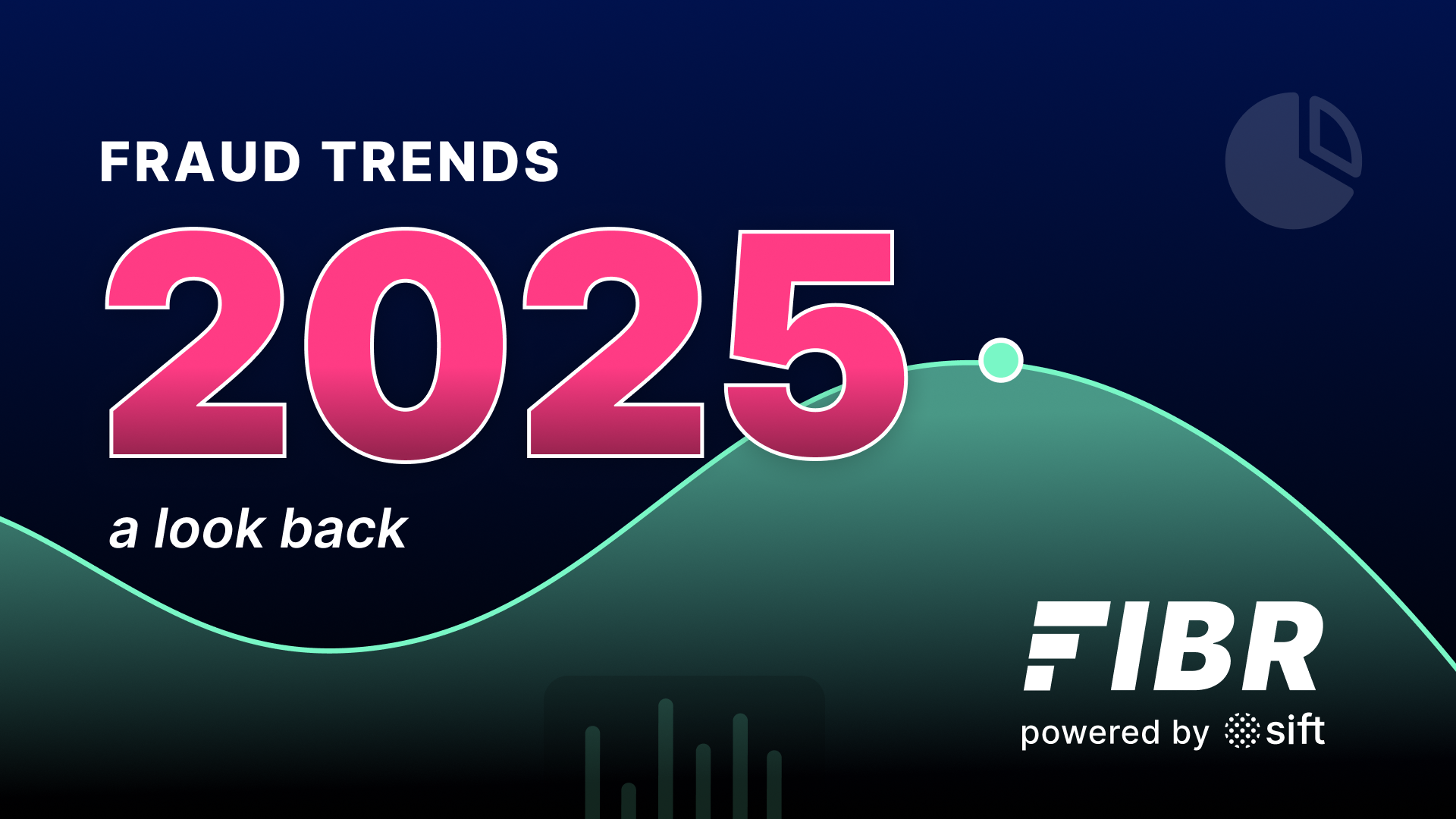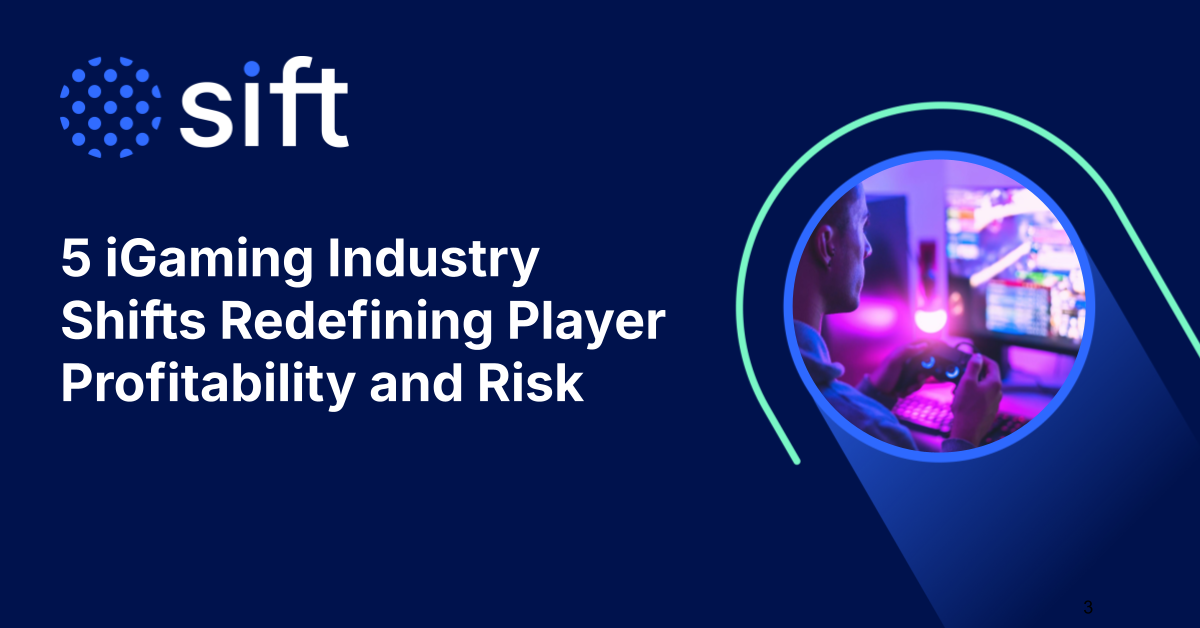The billion-dollar fraud economy continues to prosper, leaving no industry or business untouched. Blindspots make businesses more vulnerable than ever, and businesses must anticipate and proactively address them to succeed. The most effective way to outsmart fraud requires a holistic fraud prevention solution.
Discover how to identify the right fraud prevention solution for your business to proactively prevent fraud, scale operations, and drive business growth.
Why the need for fraud prevention technology?
In the U.S., e-commerce sales reached $1.03 trillion in 2022, surpassing $1 trillion for the first time ever. Potentially significant payouts motivate fraudsters to pursue and adapt fraud strategies ruthlessly. U.S. consumers reported losing nearly $8.8 billion to fraud in 2022, more than a 30% increase over the previous year.
Fraud vectors have changed drastically over the years, transforming from siloed incidents to a vast, crowded, and interconnected network known as the Fraud Economy. Involvement with the Fraud Economy jeopardizes a business’s financial stability, introduces legal risk, and endangers customer trust. Understandingly, 80% of consumers say they would stop engaging with a brand due to fraud.
Reacting to existing fraud is not sufficient for success. Businesses need a proactive approach that anticipates and outsmarts these motivated fraudsters. Only real-time fraud prevention technology can adapt quickly enough to evolving threats while addressing the complex and vast scale of vulnerable data.
What is a fraud prevention solution?
A fraud prevention solution is a suite of technology tools designed to secure each step of the customer journey and protect and grow your business. The most effective solutions utilize Dynamic Friction to automatically block fraudsters while providing a seamless user experience for trusted customers. This proactively prevents fraudulent activity and enables secure growth at scale.
What is the difference between fraud prevention and detection?
Fraud detection responds to an existing threat, while fraud prevention proactively stops fraudulent activity from happening. Together, fraud detection and prevention create a holistic approach to fighting existing threats while establishing proactive fraud prevention strategies to minimize the impact of future threats.
Fraud prevention helps companies stay one step ahead of fraudsters. An important aspect of fraud prevention includes risk decisioning. An end-to-end fraud prevention solution built on deep, diversified data can accurately assess the risk of users along every step of the customer journey. Accurate risk assessments reduce false positive rates by applying the appropriate amount of friction for fraudsters versus trusted customers. Fraudsters get stopped in their tracks, while trusted customers enjoy a seamless experience without additional authentication measures.
Safely removing friction from the customer experience helps retain valuable paying customers. On the other hand, inaccurately adding friction to the customer experience costs companies significantly—38% of online shoppers abandoned purchases when asked for additional security checks like two-factor authentication or CAPTCHA. Even more, 36% of customers have had a transaction falsely declined, known as a “customer insult,” and 25% of customers bought from the competition after experiencing such an insult.
Types of fraud prevention solutions
Fraud prevention solutions vary based on the type and complexity of the problems they solve. Point solutions are the most basic type of fraud prevention solution and solve a single use-case issue such as fraud detection, identity verification, or monitoring services. This approach was practical when fraud vectors existed as siloed events. But, as the Fraud Economy becomes more complex, point solutions lack the holistic perspective necessary to prevent fraud across the entire customer journey.
Fraud prevention platforms solve an array of problems across the global Fraud Economy. With a fraud prevention platform, businesses can deliver seamless customer experiences and simultaneously reduce exposure to fraud and abuse. Typically, platforms also offer partner integrations to extend fraud prevention services across a network of trusted businesses.
Keep in mind that each fraud prevention platform manages fraud differently, and the depth and flexibility of the specific features must be considered. Many fraud prevention platforms excel at adding friction to the user experience to prevent fraud, but the ability to add friction isn’t enough. You need a solution that dynamically adapts the amount of friction based on the risk of each individual user. Clunky solutions accidentally add friction to trusted customers, which causes businesses to lose customers, stunting growth and limiting revenue potential.
What are the key features to look for in a fraud prevention solution?
Embrace a fraud prevention platform with a holistic set of effective features. Look for features that give your business control and transparency over your fraud operations while helping drive revenue via secure growth. To maximize your company’s investment in fraud prevention, ensure your new solution includes the following features.
Real-time monitoring and alerting
Fraudsters exploit opportunities. These windows of opportunity don’t need to exist for a long time—just long enough to allow for access to information such as credentials or the transfer of capital. In the digital world, this can happen very quickly.
Real-time monitoring and alerts enable companies to detect fraud in real-time and push notifications instantaneously. To be effective and not cry wolf, these alerts must be accurate and not activated based on false alarms. Check how this monitoring and alerting system works—what technology is used? The best solutions will utilize anomaly detection algorithms to learn from past data and trigger real-time and accurate alerts based on unusual changes.
Robust machine learning models
While many platforms utilize machine learning, remember that the model is only as effective as its data. Understanding where the data comes from and what it covers will help determine if the specific platform suits your needs.
The machine learning model should include a mix of data directly related to your business as well as global data from inside and outside your industry. This casts a wide net that is more likely to catch savvy fraudsters, regardless of whether the specific fraud tactics have been used in your industry.
Sift’s advanced machine learning models are built upon our proprietary global data network. This network functions like a dynamic hub, collecting shared signals from diverse customers across industries, regions, and fraud vectors. Sift processes one trillion events annually and can detect new attack patterns in just 250 milliseconds, providing near-instant protection for every user on the Sift network. Any attempted attack on one Sift customer automatically feeds into our system, preventing it from affecting other users.
Uphold, a global digital money platform, used Sift’s patented machine-learning models to dynamically apply friction to the customer journey so that risky actions get flagged for additional security measures. At the same time, trustworthy transactions get fast-tracked, significantly lowering false positives and customer insults.
“We integrated with ease and began training the Sift model immediately, which took less time than expected and provided much better results.” – Rob McCall, Director of Fraud Prevention, Uphold
Proactive prevention capabilities
As your business seeks a fraud solution, focus on a comprehensive platform that detects, mitigates, and proactively prevents fraudulent activity. This should include the ability to automatically surface critical data to inform your decisions, such as advanced visual analytics and bulk actioning of transactions.
While detecting fraudulent activity is crucial, preventing risky transactions before they occur is the ultimate defense. Businesses that focus on prevention establish a proactive stance against potential threats, creating a more resilient and secure foundation for sustained growth. This approach not only minimizes financial losses but also preserves the trust and confidence of your customers.
Payment review automation
Automating payment reviews saves time and promotes a proactive response to potential risks. Automation capabilities vary between platforms, so watch for a platform that provides control and transparency over your fraud operations. Avoid solutions that automatically apply the same friction to fraudsters and trusted customers. A high false positive rate indicates that trusted customers frequently get hit with unnecessary friction.
Balancing adequate security with a frictionless user experience differentiates the expertise of platforms. Through Dynamic Friction, Sift allows trusted customers to proceed seamlessly while automatically intervening to block cybercriminals. Fueled by data-driven risk decisioning, Dynamic Friction strikes the right balance between safety and user experience. Gustavo Tonti, a Fraud Manager at Destinia explains, “Their learning is fast and their scores are reliable. We are confident that if Sift gives a high score, it is without a doubt fraudulent.”
Flexible customization options
A one-size-fits-all approach doesn’t serve unique risk profiles, either missing cybercriminals or applying too much friction to trusted customers. Customization enables businesses to tailor strategies by adjusting parameters, thresholds, and rules. This flexibility ensures a finely-tuned solution that balances robust security with a frictionless customer experience.
Sift offers custom-tailored machine learning models to proactively prevent fraud and drive secure growth. Beyond utilizing our global data network, Sift allows businesses to integrate their own signals, creating a nuanced approach that aligns seamlessly with the unique environment at hand. Combining our global data network with your custom data, Sift provides an advanced fraud prevention solution as unique as your operations.
DoorDash, the popular food delivery platform, used Sift to prevent thousands of dollars in daily fraud losses and increase efficiency by 3x.
“The amount of collective data we have access to with Sift is what makes Sift so valuable to us. Sift works with hundreds of customers, and as part of the global network we benefit from that shared intelligence to protect our community.” – Cameron Javier, Software Engineer at DoorDash
User-friendly interface with clear risk scoring
A user-friendly interface is essential for effective fraud prevention, minimizing the learning curve for adoption and troubleshooting. It allows businesses to easily configure dynamic rules, monitor transactions, and respond to real-time alerts. This accessibility enables fraud teams to make quick and informed decisions.
Clear and concise risk scoring is equally vital. A transparent scoring system provides immediate insights into transaction risk, helping to speed up decision-making. With easy-to-understand scores, fraud teams can quickly assign the appropriate friction measures for a secure and seamless user experience.
Visibility into decision-making
Visibility into the decision-making process provides insights into the factors and data points considered during risk evaluation. Access to the rationale behind flagged transactions helps fraud teams respond more effectively.
When a low-risk score blocks a transaction or requires manual review, teams cannot make an informed decision about friction unless they know what caused the low score. With visibility into the reasoning behind a specific decision, fraud teams can apply the appropriate friction during manual reviews and quickly handle the issue at hand. Displaying this decision data in an easily understandable and visual format enhances effectiveness, so look for a solution with clear and compelling data visualization capabilities.
Considerations when choosing the best fraud solution for your business
Assessing fraud prevention solutions can be overwhelming without knowing the most important factors to consider. Read on to learn the top considerations for choosing a fraud solution that reduces exposure to fraud and abuse while securely driving expansion and growing revenue.
Industry-specific vulnerabilities
Fintech
The exponential growth in the fintech industry, valued at $5.5 trillion, has become a magnet for fraudsters. The transformation led by neo and challenger banks, coupled with the surge in cryptocurrency popularity, provides consumers with unprecedented financial services options. But, this surge has also led to an alarming rise in fraud cases. In 2020 alone, cryptocurrency-related crimes resulted in a staggering $1.9 billion in losses, highlighting the pressing need for robust fraud prevention measures to safeguard both the industry and its users.
Payment service providers (PSPs) industry
Payment Service Providers (PSPs) occupy a unique position at the intersection of the Payment Ecosystem and the Fraud Economy, engaging with merchants and customers. This exposes PSPs to vulnerabilities at both the transaction and merchant levels. With the global digital payment industry valued at $81 billion, PSPs face the challenge of rapid growth, necessitating real-time adaptability to differentiate themselves in a crowded market. In 2021 alone, PSPs witnessed a significant 169% increase in payment fraud rates, underscoring the critical need for anti-fraud measures to protect against threats, including collusion through fraudulent merchant accounts.
Retail
The retail industry is thriving, but in-store and online retailers face growing tactics from fraudsters. In late 2020, the average value of attempted retail fraud surged by 70%. As shopping habits evolve with new methods like BOPIS and one-click checkout, merchants must prepare for diverse fraud vectors while minimizing friction for legitimate transactions. With shoppers spending a staggering $4.4 trillion in 2020, marking a nearly 7% increase, retailers must prepare for opportunistic cyber criminals looking to exploit the surge in transaction volumes.
Learn about Sift’s solutions for retail
iGaming
The iGaming industry grapples with the delicate interplay between security and user experience while managing complex regulations. Regulatory frameworks vary across different jurisdictions, requiring companies to stay vigilant and compliant with anti-money laundering and Know Your Customer (KYC) policies. Striking a balance between effective security and seamless player transactions is a persistent challenge.
See how iGaming secures players with Sift
Cost and budgetary constraints
When considering a fraud prevention solution, weigh the value of outsourcing to a solution provider against the costs of building an in-house system. While a third-party solution may cost more upfront, building an in-house solution requires substantial investments in time and internal resources.
Remember that the investment in a solution will be partially offset by the reduction in costs associated with manual reviews. Implementing an effective fraud prevention solution streamlines the review process and translates into fewer analysts handling more cases efficiently. Utilizing a data-driven and automated solution also provides a more effective fraud prevention strategy that proactively protects your business against fraudsters and maximizes revenue potential.
Scalability for future growth
Traditional rules-based fraud prevention solutions are too clunky and static for the digital fraud landscape. As fraud attacks develop in complexity and sophistication, businesses must transition away from fixed-rule systems that inhibit growth. Effective fraud prevention platforms use Dynamic Friction to handle the nuances of risk decisions while managing an increasing volume of cases. Dynamic Friction ensures a tailored and efficient user experience while addressing various types of fraud, safeguarding businesses against damage to their reputation, and driving secure growth.
Integration with existing systems
Compatibility with established systems streamlines implementation, minimizing disruption and optimizing the efficiency of fraud prevention measures. Choosing a solution that seamlessly integrates with your current infrastructure enhances the overall effectiveness of fraud prevention, creating a cohesive and well-coordinated defense against evolving threats.
Businesses should prioritize solutions with a robust partner program, which signifies a commitment to collaboration and ensures a comprehensive data ecosystem. A strong partner program indicates a solution provider’s dedication to fostering long-term partnerships, making it a key consideration for businesses seeking a reliable and future-proof fraud prevention strategy. The quickly expanding app, Swan Bitcoin, used Sift’s network of integrations to scale with company growth and fraud patterns.
“What initially drew me to Sift was the number of other partners it integrated with, and the ability to leverage the network effect of Sift across the partner ecosystem. For a startup, leveraging data from others can be a powerful way to enrich your own threat detection data.” – Yan Pritzker, Co-founder & CTO at Swan Bitcoin
Data management
Proactively preventing fraud requires effective data management. Consider the volume of data a vendor processes, with larger datasets leading to enhanced accuracy. Evaluate the relevance of the data to your specific business context, is it retailer-specific, industry-specific, region-specific, or universal? Is there an option to customize the type of data being used?
In addition, how vendors retrieve outcome data contributes to the solution’s efficacy, whether through manual review decisions, chargebacks, or card scheme reports. Choosing vendors with adaptable and regularly retrained machine learning models is essential, ensuring real-time learning from the most recent historical data. The transparency and usability of model outputs enhance the overall value, allowing businesses to make informed decisions, drive accountability, and build trust with customers.
Compliance with industry regulations
When investing in a fraud prevention solution, prioritize how the solution manages compliance with complex regulations. Failing to comply with regulations results in financial penalties and can hinder partnerships with specific vendors. Your fraud prevention strategy must align with and adapt to diverse regulatory frameworks to secure both financial stability and industry credibility.
Regulations vary based on location, industry, and types of data. In the UK, adherence to PSD2 regulations is crucial, ensuring secure payment processes. Visa compelling evidence requirements demand robust fraud prevention measures to provide sufficient proof in case of disputes. The ever-changing chargeback codes pose a challenge, and businesses must stay updated to avoid penalties and maintain vendor relationships. Industry-specific regulations further complicate matters across cities, states, and countries, with distinct requirements for sectors like crypto and iGaming.
Still curious about what features and capabilities are the most important for your business? Explore an in-depth analysis of what to look for in a fraud prevention solution.
Stop fraud and boost revenue with Sift
Sift’s Digital Trust & Safety Platform gives your business control and transparency over your fraud operations while helping retain trusted customers, drive secure growth, and maximize revenue. Unlike fragmented point solutions, Sift’s comprehensive platform seamlessly manages every facet of fraud operations, offering real-time data connectivity and intelligent automation across the entire customer journey. From account authentication to dispute response, Sift ensures intelligent fraud management that is both simple and secure.
Our platform’s patented technology addresses a spectrum of threats, including payment fraud, account takeovers, spam, scams, and chargebacks, focusing on high-impact cases to drive revenue growth. Our robust global data network empowers Dynamic Friction to automatically apply increasing pressure to cyber criminals while providing a seamless user experience for trusted customers. This proactively prevents fraudulent activity and enables secure growth at scale.







